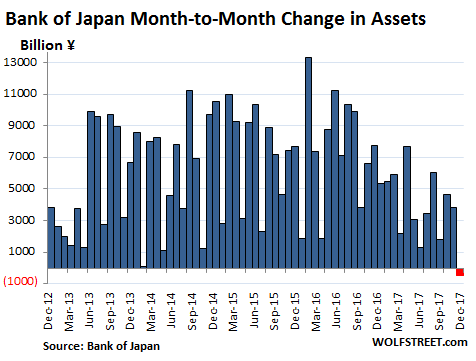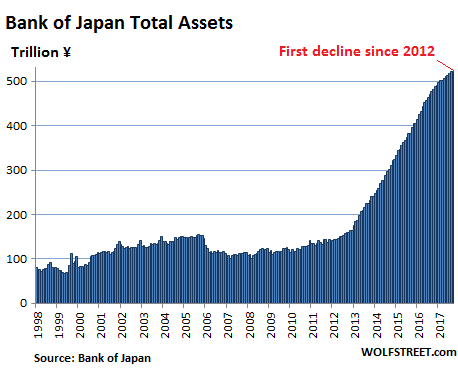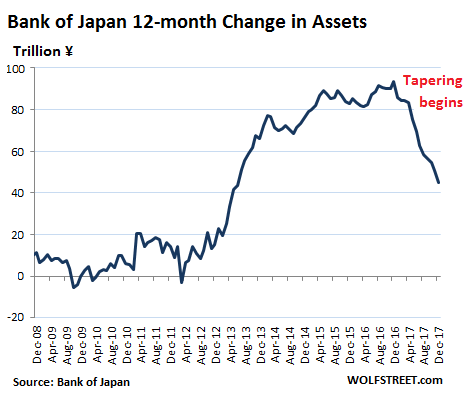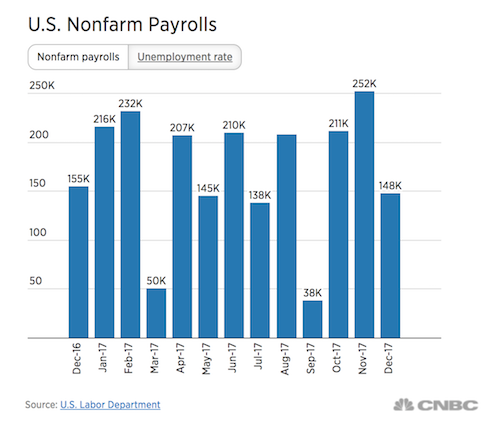
Wassily Kandinsky Contrasting Sounds 1924

Take their power away?!
• Every Fed Tightening Cycle ‘Creates A Meaningful Crisis Somewhere’ (MW)
Federal Reserve rate increases are a lot like shaking an overripe fruit tree. That’s the analogy offered by Deutsche Bank macro strategist Alan Ruskin in a note late Wednesday, in which he urged clients not to “overcomplicate” the macro picture. “A starting point should be that every Fed tightening cycle creates a meaningful crisis somewhere, often external but usually with some domestic (U.S.) fallout,” he wrote. To back it up, Ruskin offered the following history lesson:
“Going back in history, the 2004-6 Fed tightening looked benign but the US housing collapse set off contagion and a near collapse of the global financial system dwarfing all post-war crises. The late 1990s Fed stop/start tightening included the Asia crisis, LTCM and Russia collapse, and when tightening resumed, the pop of the equity bubble. The early 1993-4 tightening phase included bond market turmoil and the Mexican crisis. The late 1980s tightening ushered along the S&L crisis. Greenspan’s first fumbled tightening in 1987 helped trigger Black Monday, before the Fed eased and ‘the Greenspan put’ took off in earnest. The early 80s included the LDC/Latam debt crisis and Conti Illinois collapse. The 1970s stagflation tightening was when the Fed was behind ‘the curve’ and where inflation masked a prolonged decline in real asset prices.”
So what about now? The fed funds rate stands at 1.50% to 1.75% following a series of slow rate increases that began in December 2015, lifting it from near zero. The degree of tightening might seem pretty tame, but Ruskin notes that it comes after a period of “extreme and prolonged” accommodation and is also taking forms that economists and investors don’t fully understand as swollen balance sheet begins to shrink.

The stronger the dollar the more likely rate hikes get.
• Fed Minutes Show Support For June Hike And Calm About Inflation Outlook (MW)
Federal Reserve officials in their meeting in early May confirmed they planned to raise interest rates in June and were not concerned they were behind the curve on inflation. “Most participants judged that if incoming information broadly confirmed their economic outlook, it would likely soon be appropriate for the FOMC to take another step in removing policy accommodation,” the minutes said. Traders in the federal funds futures market see more than a 90% chance of a June rate hike. Although inflation hit the Fed’s 2% target in the latest reading for March, for the first time in a year, officials were not convinced it would remain there for long.
“It was noted that it was premature to conclude that inflation would remain at levels around 2%, especially after several years in which inflation had persistently run below the Fed’s 2% objective,” the minutes said. Only a “few” officials thought inflation might move “slightly” above the 2% target. “It has taken them so long to get there, with so many fits and starts, they are not quite sure it’s going to stay there,” said Michael Arone, chief investment strategist for State Street Global Advisors. Arone said the minutes were consistent with three total hikes this year although the Fed gave itself wiggle room if inflation picks up markedly. “They didn’t take [a fourth hike] off the table,” he said.
On the trade dispute with China, officials said the possible outcome on inflation and growth remained “particularly wide,” but there was some concern the dispute would hurt business confidence.

Up to 25% tariffs. How about building better cars? Or weaning yourself off the addiction?
• US Launches Auto Import Probe (R.)
The Trump administration has launched a national security investigation into car and truck imports that could lead to new U.S. tariffs similar to those imposed on imported steel and aluminum in March. The national security probe under Section 232 of the Trade Expansion Act of 1962 would investigate whether vehicle and parts imports were threatening the industry’s health and ability to research and develop new, advanced technologies, the Commerce Department said on Wednesday. “There is evidence suggesting that, for decades, imports from abroad have eroded our domestic auto industry,” Commerce Secretary Wilbur Ross said in a statement, promising a “thorough, fair and transparent investigation.”
Higher tariffs could be particularly painful for Asian automakers including Toyota, Nissan, Honda and Hyundai, which count the United States as a key market, and the announcement sparked a broad sell-off in automakers’ shares across the region. The governments of Japan, China and South Korea said they would monitor the situation, while Beijing, which is increasingly eyeing the United States as a potential market for its cars, added that would defend its interests. “China opposes the abuse of national security clauses, which will seriously damage multilateral trade systems and disrupt normal international trade order,” Gao Feng, spokesman at the Ministry of Commerce, said at a regular news briefing in Beijing on Thursday which focused largely on whether it is making any progress in its trade dispute with Washington.
[..] Roughly 12 million cars and trucks were produced in the United States last year, while the country imported 8.3 million vehicles worth $192 billion. This included 2.4 million from Mexico, 1.8 million from Canada, 1.7 million from Japan, 930,000 from South Korea and 500,000 from Germany, according to U.S. government statistics. At the same time, the United States exported nearly 2 million vehicles worldwide worth $57 billion. German automakers Volkswagen, Daimler and BMW all have large U.S. assembly plants. The United States is the second-biggest export destination for German auto manufacturers after China, while vehicles and car parts are Germany’s biggest source of export income. Asked if the measures would hit Mexico and Canada, a Mexican source close to the NAFTA talks said: “That probably is going to be the next battle.”

For now it’s all opaque.
• China Signals To State Giants: ‘Buy American’ Oil And Grains (R.)
China will import record volumes of U.S. oil and is likely to ship more U.S. soy after Beijing signalled to state-run refiners and grains purchasers they should buy more to help ease tensions between the two top economies, trade sources said on Wednesday. China pledged at the weekend to increase imports from its top trading partner to avert a trade war that could damage the global economy. Energy and commodities were high on Washington’s list of products for sale. The United States is also seeking better access for imports of genetically modified crops into China under the deal. As the two sides stepped back from a full-blown trade war, Washington neared a deal on Tuesday to lift its ban on U.S. firms supplying Chinese telecoms gear maker ZTE, and Beijing announced tariff cuts on car imports.
But U.S. President Donald Trump indicated on Wednesday that negotiations were still short of his objectives when he said any deal would need a “different structure”. China is the world’s top importer of both oil and soy, and already buys significant volumes of both from the United States. It is unclear how much more Chinese importers will buy from the United States than they would have otherwise, but any additional shipments would contribute to cutting the trade surplus, as demanded by Trump. Asia’s largest oil refiner, China’s Sinopec will boost crude imports from the United States to an all-time high in June as part of Chinese efforts to cut the surplus, two sources with knowledge of the matter said on Wednesday.

Erdogan defeated?
• Turkey Halts Lira’s Free Fall – But It’s Not Out Of The Woods Yet (MW)
Turkey’s central bank intervened to halt the free fall of the Turkish lira on Wednesday, but it isn’t clear whether policy makers will be able to stave off a full-fledged currency crisis. The Central Bank of the Republic of Turkey raised its late liquidity window lending rate by 300 basis points on Wednesday, in a surprise move that put a halt to the lira selloff — at least for now. The lending rate now sits at 16.5%, compared with 13.5% before. The U.S. dollar had rallied to a historic high against Turkey’s lira on Wednesday, buying 4.9233 lira at the high, before the path reversed on the back of the CBRT’s action and the lira found its feet again. The buck last bought 4.7015 lira. In the year to date, the Turkish currency has dropped more than 20% against the dollar, according to FactSet data.
The euro-lira pair behaved similarly, first rallying to an all-time high but paring the rise after the rate increase. The euro last bought 5.5084 lira. The U.S. and eurozone are two of Turkey’s most important trading partners. The central bank has been operating in a peculiar environment given that Turkey’s inflation has been hitting double digits and its currency keeps sliding to historic lows. Moreover, the government of President Recep Tayyip Erdogan has been critical of the central bank, calling for lower interest rates.

Rising dollar.
• Argentines Brace For Another Crisis As Nation Again Seeks IMF Help (R.)
Maria Florencia Humano opened a clothing store in 2016, convinced that Argentina’s long history of economic crises had ended under pro-business President Mauricio Macri. She will shutter it later this month, unable to make rent or loan payments. Soaring interest rates and a plunging currency have upended her dream and returned Argentina to a familiar place: asking the IMF for a lifeline. Humano’s decision comes just weeks after a somber Macri announced in a televised May 8 speech that Argentina would start talks with the IMF. He is seeking a credit line worth at least $19.7 billion to fund the government through the end of his first term in late 2019. The unexpected move surprised investors and stoked Argentines’ fears of a repeat of the nation’s devastating 2001-2002 economic collapse.
Many here blame IMF-imposed austerity measures for worsening that crisis, which impoverished millions and turned Argentina into a global pariah after the government defaulted on a record $100 billion in debt. Word of a potential bailout sent thousands of angry Argentines into the streets this month, some with signs declaring “enough of the IMF.” As recently as a few months ago, analysts were hailing Argentina as an emerging-market success story. Now some are predicting recession. Macri’s popularity has plummeted. [..] Macri’s free-market credentials earned him a 2017 invitation to the White House to meet U.S. President Donald Trump, who just last week on Twitter hailed the Argentine leader’s “vision for transforming his country’s economy.”
But economists say Macri badly damaged his credibility in December when his administration weakened tough inflation targets. The central bank followed with a January rate cut to goose growth, even as consumer prices kept galloping. Rising U.S. interest rates did not help. Argentina is saddled with more than $320 billion in external debt, equivalent to 57.1% of GDP, much of it denominated in dollars. Jittery investors hit the exits. The peso swooned. The central bank sold $10 billion in reserves trying to prop up the peso, forcing Macri to seek assistance from the IMF.

And getting harsher all the time.
• US Birth Rates Are Falling Because This Is A Harsh Place To Have A Family (G.)
America’s birth rate has fallen to a 30-year low, let the hand-wringing and finger-pointing begin. It’s those selfish women, wanting careers before kids! Or, gasp, not wanting kids at all! It’s all those abortions! It’s Obama’s fault! The reality is, for all its pro-family rhetoric, the US is a remarkably harsh place for families, and particularly for mothers. It’s a well-known fact, but one that bears repeating in this context, that the US is one of only four countries in the world with no government-subsidized maternity leave. The other three are Lesotho, Swaziland, and Papua New Guinea, countries that the US doesn’t tend to view as its peer group.
This fact is met with shrugs from those who assume that companies provide maternity leave. Only 56% do, and of those, just 6% offer full pay during maternity leave. This assumption also ignores the fact that 36% of the American workforce, a number expected to surpass 50% in the next 10 years, are contract laborers with no access to such benefits. That gig economy you keep hearing so much about, with its flexible schedule and independence? Yeah, it sucks for mothers. That doesn’t stop companies and pundits from pushing it as a great way for working moms to balance children and career. As a gig-economy mother myself, I can tell you exactly how great and balanced it felt to go back to work two hours after giving birth.
If they return to work, mothers can look forward to an increasingly large pay gap for every child they have, plus fewer promotions. Who could resist? The option for one parent to stay home with kids is increasingly not economically viable for American families, either. A data point that got far less attention than the falling birth rate was released by the Bureau of Labor Statistics last month: 71.1% of American mothers with children under 18 are in the workforce now. It’s not just because they want to be (not that there’s anything wrong with that), but increasingly because they have to be in order to support the family.

Scripted interview?
• Yulia Skripal Gives First Interview (RT)
In her first interview since surviving an alleged nerve agent attack, Yulia Skripal said she eventually wants to return to Russia. She has not shed any light on what happened in March in Salisbury. “I came to the UK on the 3rd of March to visit my father, something I have done regularly in the past. After 20 days in a coma, I woke to the news that we had both been poisoned,” Skripal said in a video that was recorded by Reuters. She reiterated her words in a handwritten statement. She and her father, Sergei Skripal, a former Russian double-agent, were found unconscious on a public bench in the British city of Salisbury on March 4. The UK government immediately accused Russia of being behind their poisoning, but it has yet to provide evidence for the claim.
Skripal did not comment on who she thought was to blame for her poisoning. “I still find it difficult to come to terms with the fact that both of us were attacked. We are so lucky to have both survived this attempted assassination. Our recovery has been slow and extremely painful,” she said. “The fact that a nerve agent was used to do this is shocking. I don’t want to describe the details but the clinical treatment was invasive, painful and depressing.” She also said that she was “grateful” for the offers of assistance from the Russian Embassy, “but at the moment I do not wish to avail myself of their services.” Skripal reiterated what she had said in an earlier written statement released by British police: “no one speaks for me, or for my father, but ourselves.”
Following the release of the interview, Russia’s Foreign Ministry spokeswoman addressed Yulia Skripal in a comment to RT. “We’d like Yulia Skripal to know that not a single day passed without the Foreign Ministry, Russia’s Embassy in London trying to reach her with the main purpose to make sure she was not held against her will, she was not impersonated by somebody else, to get the first-hand information about her and her father’s condition,” Maria Zakharova said.
Russia’s Embassy in the UK welcomed the release of the interview, stating: “we are glad to have seen Yulia Skripal alive and well.” The video itself and the wording of the written statements, however, raised concerns with Russian diplomats, who urged London once again to allow consular access to Yulia “in order to make sure that she is not held against her own will and is not speaking under pressure.” Skripal said that the ordeal had turned her life “upside down,” both “physically and emotionally.” She added that she was now focused on helping her father to make a full recovery, and that “in the long term I hope to return home to my country.”

With the level of incompetence in UK politics, the NHS looks beyond salvation.
• NHS Needs £2,000 In Tax From Every Household To Stay Afloat (Ind.)
Taxes will “almost certainly” have to rise over the coming years simply to prevent the National Health Service and social care system from slipping further into crisis, a major new report concludes. The Institute for Fiscal Studies and the Health Foundation state that the NHS, which has been suffering the most severe fiscal squeeze since its foundation over the past eight years, now requires an urgent increase in government spending in order to cope with an influx of older and sicker patients. Funding the projected increases in health spending through the tax system would need taxes to rise by between 1.6 and 2.6% of GDP – the equivalent of between £1,200 and £2,000 per household, the experts said.
The two organisations say that state funding growth rate, which has been just 1.4% a year since 2010, will have to more than double to between 3.3% and 4% over the next 15 years if government pledges, such as bringing down waiting times and increasing the provision of mental health services, are to stand any chance of being delivered. They also say that to finance this increase the government would “almost certainly need to increase taxes”. “If we are to have a health and social care system which meets our needs and aspirations, we will have to pay a lot more for it over the next 15 years. This time we won’t be able to rely on cutting spending elsewhere – we will have to pay more in tax,” said the IFS’s director Paul Johnson.

Raises some interesting questions. I can block him, but he cannot block me. I can all him “Corrupt Incompetent Authoritarian” and much much worse, and he’s going to have to swallow it.
• Trump’s Blocking Of Critics On Twitter Violates Constitution – US Judge (R.)
Trump has made his @RealDonaldTrump Twitter account an integral and controversial part of his presidency, using it to promote his agenda, announce policy and attack critics. He has blocked many critics from his account, which prevents them from directly responding to his tweets. U.S. District Judge Naomi Reice Buchwald in Manhattan ruled that comments on the president’s account, and those of other government officials, were public forums, and that blocking Twitter users for their views violated their right to free speech under the First Amendment of Constitution. Eugene Volokh, a University of California Los Angeles School of Law professor who specializes in First Amendment issues, said the decision’s effect would reach beyond Trump.
“It would end up applying to a wide range of government officials throughout the country,” he said. The U.S. Department of Justice, which represents Trump in the case, said, “We respectfully disagree with the court’s decision and are considering our next steps.” Twitter, which is not a party to the lawsuit, declined to comment on the ruling. Buchwald’s ruling was in response to a First Amendment lawsuit filed against Trump in July by the Knight First Amendment Institute at Columbia University and several Twitter users. The individual plaintiffs in the lawsuit include Philip Cohen, a sociology professor at the University of Maryland; Holly Figueroa, described in the complaint as a political organizer and songwriter in Washington state; and Brandon Neely, a Texas police officer.
Cohen, who was blocked from Trump’s account last June after posting an image of the president with words “Corrupt Incompetent Authoritarian,” said he was “delighted” with Wednesday’s decision. “This increases my faith in the system a little,” he said. Novelists Stephen King and Anne Rice, comedian Rosie O’Donnell, model Chrissy Teigen, actress Marina Sirtis and the military veterans political action committee VoteVets.org are among the others who have said on Twitter that Trump blocked them. Buchwald rejected the argument by Justice Department lawyers that Trump’s own First Amendment rights allowed him to block people with whom he did not wish to interact.
“While we must recognize, and are sensitive to, the president’s personal First Amendment rights, he cannot exercise those rights in a way that infringes the corresponding First Amendment rights of those who have criticized him,” Buchwald said. She said Trump could “mute” users, meaning he would not see their tweets while they could still respond to his, without violating their free speech rights.

Said it before: putting it in monetary terms is counter-productive. Only when we recognize that it’s not about money will we do something.
• Hitting Toughest Climate Target Will Save World $30 Trillion In Damages (G.)
Achieving the toughest climate change target set in the global Paris agreement will save the world about $30tn in damages, far more than the costs of cutting carbon emissions, according to a new economic analysis. Most nations, representing 90% of global population, would benefit economically from keeping global warming to 1.5C above pre-industrial levels, the research indicates. This includes almost all the world’s poorest countries, as well as the three biggest economies – the US, China and Japan – contradicting the claim of US president, Donald Trump, that climate action is too costly. Australia and South Africa would also benefit, with the biggest winners being Middle East nations, which are threatened with extreme heatwaves beyond the limit of human survival.
However, some cold countries – particularly Russia, Canada and Scandinavian nations – are likely to have their growth restricted if the 1.5C target is met, the study suggests. This is because a small amount of additional warming to 2C would be beneficial to their economies. The UK and Ireland could also see some restriction, though the estimates span a wide range of outcomes. The research, published in the journal Nature, is among the first to assess the economic impact of meeting the Paris climate goals. Data from the last 50 years shows clearly that when temperatures rise, GDP and other economic measures fall in most nations, due to impacts on factors including labour productivity, agricultural output and health.
The scientists used this relationship and 40 global climate models to estimate the future economic impact of meeting the 1.5C target – a tough goal given the world has already experienced 1C of man-made warming. They also assessed the long-standing 2C target and the impact of 3C of warming, which is the level expected unless current plans for action are increased.

It’s not gone. But it is under threat.
• The Mediterranean Diet Is Gone: Region’s Children Are Fattest In Europe (G.)
For kids in Greece, Spain and Italy, the Mediterranean diet is dead, according to the World Health Organisation, which says that children in Sweden are more likely to eat fish, olive oil and tomatoes than those in southern Europe. In Cyprus, a phenomenal 43% of boys and girls aged nine are either overweight or obese. Greece, Spain and Italy also have rates of over 40%. The Mediterranean countries which gave their name to the famous diet that is supposed to be the healthiest in the world have children with Europe’s biggest weight problem. Sweets, junk food and sugary drinks have displaced the traditional diet based on fruit and vegetables, fish and olive oil, said Dr Joao Breda, head of the WHO European office for prevention and control of noncommunicable diseases.
“The Mediterranean diet for the children in these countries is gone,” he said at the European Congress on Obesity in Vienna. “There is no Mediterranean diet any more. Those who are close to the Mediterranean diet are the Swedish kids. The Mediterranean diet is gone and we need to recover it.” Children in southern Europe are eating few fruit and vegetables and drinking a lot of sugary colas and other sweet beverages, said Breda. They snack. They eat sweets. They consume too much salt, sugar and fat in their food. And they hardly move. “Physical inactivity is one of the issues that is more significant in the southern European countries,” he said. “A man in Crete in the 60s would need 3,500 calories because he was going up and down the mountain.”













